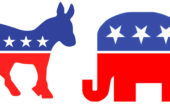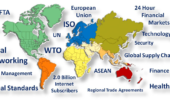Re Ian Bremmer 'Could third-party candidates upend the 2024 US election?' 3 April The current political movement in the USA…
Wednesday Night #1891
Written by Diana Thebaud Nicholson // June 6, 2018 // Wednesday Nights // Comments Off on Wednesday Night #1891
Tariffs & Trade wars, Singapore Summit, Charlevoix G7, Italy’s government, Ontario elections, California & other primaries, Guatemala’s volcano, the plastics crisis … what a week.
The tariff debate is not going away
The 2018 Charlevoix G7 opens on Friday and promises to be fractious (Trump blows up G7 agenda). In last week’s lead-up meeting at Whistler, the G7 finance ministers and central bankers expressed ‘unanimous concern and disappointment’ with the U.S. over tariffs. (Note the presence of Wednesday Night and BCA alumnus Steve Poloz at that meeting.) Meanwhile, as PM Trudeau announced retaliatory tariff measures, reactions from commentators were generally approving:
Andrei Sulzenko (The Globe and Mail) on autos and trade: “So, the auto inquiry, like the previous steel and aluminum case, is really all about cheap bullying tactics. There is no underlying strategy other than playing to the electoral base, which will wise up to the fact these actions are against its own economic self-interest once retaliation kicks in.”
Meredith Lilly (CBC) on the Trump tariffs: “ We must remember that Canada’s greatest leverage with the Americans has always been Americans themselves. Donald Trump may have started this, but no matter what action Canada takes, Justin Trudeau won’t finish it. Americans will, one way or another.”
Andrew Coyne’s take was less optimistic about the effectiveness of trade wars. “Even in concert with the other countries targeted, it is unlikely that we can cause Trump to alter course, for the simple reason that he is Trump. A normal president in possession of a rational mind might well be dissuaded by the united opposition of much of the democratic world. Trump is not that president. If he were he would not have slapped the tariffs on us in the first place, in open defiance not just of economic sense or international trade law, but of the very “military security” invoked as its justification.”
We have taken considerable pleasure in demonizing the Koch brothers, although we appreciate their support for PBS, however, it’s time to take a deep breath and careful second look, especially in view of this from the New York Times
“After pointedly declining to support Trump during the 2016 campaign, the Koch brothers decided to pragmatically embrace pieces of the administration’s policy agenda when he won the election. In addition to the tax cuts, they also benefited from major deregulation and scores of business-friendly judges.
But they’ve grown frustrated and become more outspoken in recent months as Trump has followed through on some of the protectionist and populist rhetoric that made them leery of him in the first place, including tariffs, deficit spending and not protecting “dreamers.” (The Kochs remain very pro-immigration.)
The Koch network on Monday announced a multiyear, multimillion-dollar campaign to oppose the Trump tariffs.”
James Fallows recently argued that America’s most important diplomatic relationship—and one the Trump administration may be fumbling—is with China.
Mike Lofgren disagrees: The U.S. relationship with China is extremely important, and is being horribly fumbled—as is every other global relationship—but I think the relative novelty of China as a near peer … has led pundits to overstate its singularity.
The old, boring EU is still the most important relationship, for the same reason people don’t recognize it as such: It’s been there for so long, and has been so deeply embedded, that we’ve taken it for granted. The EU has a greater GDP than China and a greater aggregate military budget; and more to the point, the deep cultural, political, and military ties make it a close cousin. Read more responses, and James Fallows’ reply
The Singapore Summit with North Korea, is on. So much has been written, so many declarations parsed, we will limit ourselves to two analyses that bear reading and re-reading as the situation evolves.
Despite summit diplomacy, Korea war risks have risen
(Brookings) The risks of war are higher now than before the drive to the summit. But diplomacy can still succeed, if Trump allows Secretary of State Mike Pompeo and his team to drive the strategy, and allows Pompeo and Bolton to wield the Trump personality as a negotiating lever. On North Korea, we have seen disciplined Trump, unpredictable Trump, and petulant Trump. If Pompeo, Bolton and Mattis can do enough to reassure South Korea and Japan; if Trump himself maintains his relationships with Xi; and if the team plays their unwieldly and tempestuous president cleverly, this is the one arena where the “mad man” theory of the presidency can produce results. If it fails now, we are well on our way to war.
Commentary: From inside North Korea, clues about Kim’s agenda
If denuclearization were to progress, how would scientists and technicians feel after having been lauded and feted as indispensable to the DPRK’s existence? Recent lessons from the disintegration of the Soviet Union provide some answers. When Ukraine gave up its nuclear weapons after signing the 1994 Budapest Memorandum on Security Assurances, its massive missile factory, Yuzhmash, lost thousands of workers. Many reportedly went to North Korea, Iran, and Pakistan to work in the nuclear industry; some stole and sold missile parts illegally. Individual survival replaced national interests, what Yuzhmash in-house historian Vladimir Platonov called “our pride” in keeping “the Americans up at night.” Preventing nuclear proliferation via “loose scientists,” not just “loose nukes,” must be integrated into any North Korean denuclearization strategy.
At least, we need not worry about security. As a devoted reader of Rudyard Kipling, we rejoice that With khukris and assault rifles, Singapore’s Gurkhas to guard Trump-Kim summit
If you are not familiar with the history of the Gurkhas, read ‘Ayo Gorkhali!’.
U.S. Primaries
Voters went to the polls on Tuesday in eight states: Alabama, California, Iowa, Mississippi, Montana, New Jersey, New Mexico and South Dakota. Most of the attention this week has focused on California, which has an unusual open primary system. Democrats are vying for Republican-held congressional seats, the governorship is up for grabs, and the veteran senator Dianne Feinstein is running for re-election. Early results include Newsom Will Face Cox on the Ballot for California Governor — Gavin Newsom, a Democratic former mayor of San Francisco, and John Cox, a Republican backed by President Trump, won the two spots in the race to succeed Gov. Jerry Brown. More early results
It looks as though the PCs will win Thursday’s elections in Ontario. Although the latest poll indicates a dead heat with the NDP, given the distribution of the Tory vote, Trump North aka Doug Ford is the likely new premier.
As Margaret Wente writes “What I really want is a minority government that doesn’t last long and then a do-over with a different bunch of leaders. Is that too much to ask?
While the rest of the country may react with “God help us”, at least Conrad Black (friend of Donald Trump) will be happy. Why Doug Ford must be the next premier of Ontario — Ontario is a jurisdiction of serious discontent, seeking radical change. With its triad of party leaders, the choice is clear
While the Kinder Morgan debate continues, The Guardian offers a new twist:
Did Canada buy an oil pipeline in fear of being sued by China?
The logic to Trudeau’s action may lie in an obscure and overlooked 2014 agreement to ensure China got a pipeline built
“The logic to Trudeau’s action may lie in an obscure and often overlooked agreement called the Canada-China Foreign Investment Promotion and Protection Agreement (Fipa).
This agreement, ratified in 2014, was negotiated by the previous Harper government. It was passed without a vote in Parliament. Fipa, which remains in place until 2045, was signed to ensure that China got a pipeline built from Alberta to BC, among other benefits.
Wednesday Night authors have been busy this week
Dr. Rodrigue Tremblay: Is Donald Trump a New Herbert Hoover?
“Indeed, the Republican Trump administration’s frontal attacks against multilateral trade looks as reckless and as irresponsible as the much reviled Republican Herbert Hoover administration’s move against international trade, in 1930.”
David (Jones) writes that Italy’s and the EU’s Struggles Continue “Italy cannot be ignored in its financial travails: it is not Greece. Italy is the third largest economy in the Eurozone and ninth in the world. But also its governmental debt is the third largest in the world (just behind the United States and Japan). More importantly, Italy’s combination of low growth, high unemployment, and high public debt makes growing its way out of difficulties problematic. Lower living standards persist, and fiscal stimulus is unaffordable. … The existential problem, however, is that both parties [of the new coalition government] epitomize a hostility to EU/euro control and constraints earlier characterized by “Brexit” and anti-EU hostility demonstrated in France, Germany, and so on. Italy dodged a bullet this time; but the gun is still loaded.”
David Kilgour is no more sanguine. In Italians and the European Project, he writes: “The coalition’s promise of popular reforms rattled Italian markets and prompted warnings from European allies, calling on the new government to respect EU budget rules and not endanger the stability of the Euro zone.
The coalition plans to control the government through a “conciliation committee” and to weaken parliament by making it impossible for lawmakers to switch parties even though the freedom to do so is written into the Italian Constitution.
Their contract also pledges to keep Italy in NATO and preserve the alliance with the United States, while “reaching out to Russia … as an economic and commercial partner” and calling for an immediate end to all western sanctions on Russia and for the rehabilitation of Moscow as a “strategic counterpart” to solve regional conflicts in Syria, Libya and Yemen.”
Kyle Matthews writes in The National Post:
Iran’s allies are preparing a genocide in Yemen. But there’s still time to stop it
Baha’is have been brutally oppressed in Iran; now Yemeni rebels directed by Tehran have embraced that brutal campaign
With all of the other news to follow, you may have missed the story about the repulsive Active Shooter video game that simulates a school shooting. While it was removed from online stores ahead of its release, following a massive backlash that illustrates a shift in the public’s perception of these events, the developer has indicated he may still release Active Shooter elsewhere. Incomprehensible!
Always trying to end on a more cheerful note, we are delighted to report that Sauvé Fellow Kyle Hill and the co-founders of Teach For Canada received the Meritorious Service Award from Governor General Julie Payette on Tuesday.
The days are getting longer – but very, very slowly
As the moon pulls away from the Earth, our planet’s rotation is slowing, making our days 1/75,000 second longer each year
And finally: The Out and Abouter warns that
Terrifying Images Emerge From Within Once-Peaceful-Now-A-Security-Threat Nation Of Canada
In the wake of Donald Trump’s declaration that Canada represents a security threat, and then using that declassified intelligence as justification to tariff the northern nation back to a safe status, images are beginning to emerge from the peace-torn population. They paint a horrifying picture of a depravedly-genial country in which many people live their entire lives without holding a loaded gun, or threatening to use such, and where speaking out against the nation’s overbearing rulers can get you a witheringly polite defense of your right to debate in a townhall meeting. Yes. It is stomach turning. Again, the images below are not for the dark of heart.



